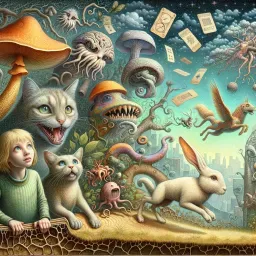O brave new world, that has such people in't!

0
0
0
0
- Meaning
- This quote is often interpreted as a mix of wonderment and irony. Miranda, who has lived isolated on an island, is expressing amazement at seeing new people for the first time. However, Shakespeare uses this phrase with a layer of irony because the audience knows the complexities and darker sides of these characters that Miranda is unaware of, highlighting the gap between innocence and experience.
- Allegory
- This image includes a young woman on a tropical island, embodying Miranda's innocence and awe at the new arrivals. The lush island with exotic plants symbolizes the setting of discovery and wonder. The elaborately dressed strangers represent the new world that Miranda is encountering, and the long, dark shadows they cast symbolize the irony and deeper complexities of human nature. This representation helps illustrate the dual nature of the phrase, capturing both the beauty of discovery and the potential for underlying darkness.
- Applicability
- In everyday life, this phrase can be used both sincerely and ironically. Sincerely, it might express genuine amazement at encountering new and fascinating people or experiences. Ironically, it can be utilized to comment on the often disappointing or flawed nature of humanity, despite initial expectations.
- Impact
- This phrase has had a significant cultural impact, symbolizing themes of discovery and the confrontation between innocence and worldliness. It's frequently referenced in literature, including in Aldous Huxley's dystopian novel "Brave New World," which uses the phrase ironically to comment on a highly controlled society. The phrase has become synonymous with optimism tempered with an understanding of human flaws.
- Historical Context
- "The Tempest" was written around 1610-1611, towards the end of Shakespeare's career, during the Jacobean era. The historical context includes the Age of Exploration, when Europe was encountering new worlds and cultures, which is echoed in the themes of discovery and wonder in the play.
- Criticisms
- Some criticisms and controversies surrounding this phrase involve its idealistic view of human nature, which can be seen as naive. Critics argue that it glosses over the darker realities of human behavior, as is evident in "The Tempest," where the characters Miranda marvels at are far from perfect.
- Variations
- There are not many variations of this specific phrase, though interpretations of it can vary by context. For instance, in a utopian vision, it might be seen as hopeful, while in a dystopian context, it can be darkly ironic.
-

The golden age is before us, not behind us.
-

Friends, Romans, countrymen, lend me your ears.
-

Alice in Wonderland.
-

Now is the winter of our discontent.
-

Brevity is the soul of wit.
-

Cowards die many times before their deaths; the valiant never taste of death but once.
-

O, had I but followed the arts!
-

A little more than kin, and less than kind.
-

But, for my own part, it was Greek to me.
-

Out, out brief candle!
No Comments